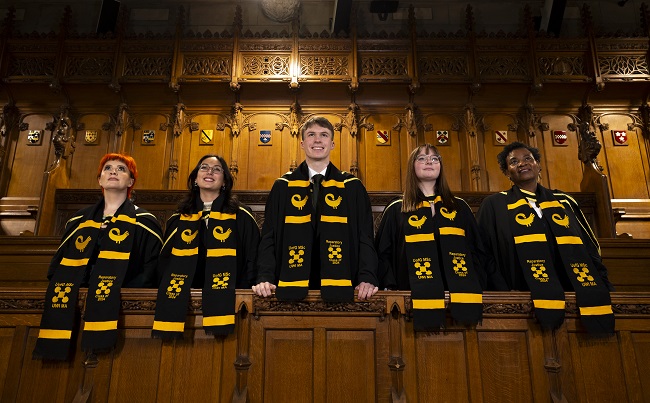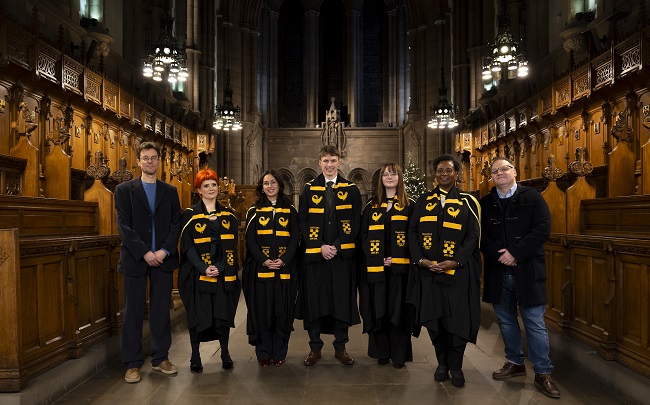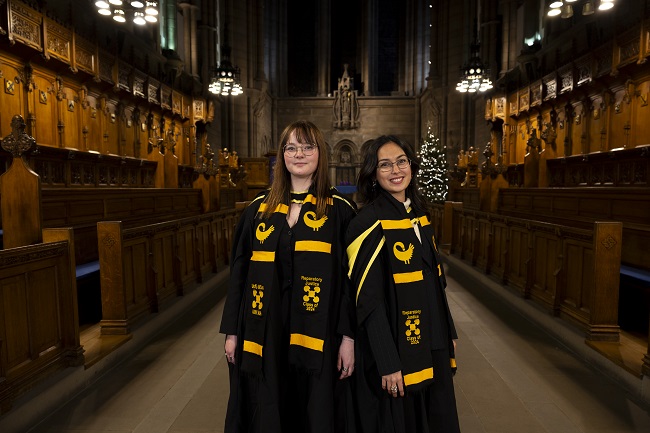First students graduate from pioneering Reparatory Justice Masters Programme
Published: 10 December 2024
A historic milestone has been reached as the first cohort of students graduates from the world’s first Masters in Reparatory Justice.

A historic milestone has been reached as the first cohort of students graduates from the world’s first Masters in Reparatory Justice.
This double-degree programme, a collaboration between the University of Glasgow and The University of the West Indies (The UWI) through their joint Glasgow-Caribbean Centre for Development Research (GCCDR), has empowered its graduates with the expertise to lead the global reparations movement.
This groundbreaking partnership has seen students engaging with the complexities of slavery, colonialism, and human rights while also contributing to a vital and growing global conversation on reparatory justice.
The double degree MA/MSc in Reparatory Justice programme brings together a diverse group of students from various disciplines, offering an unparalleled opportunity to explore the complexities of reparatory justice through the unique collaboration between Glasgow’s Beniba Centre for Slavery Studies and the Centre for Reparations Research at The UWI.
The programme also offers students the flexibility to study at either the University of Glasgow, or The UWI’s Mona or Cave Hill campuses, providing them with an international learning experience enriched by expertise from both the Caribbean and global contexts.

Fer Ortiz Vivas, who graduated with distinction said: “The Reparatory Justice Masters has been a transformative experience. Not only have I gained specialised knowledge, but I’ve had the opportunity to connect with incredible scholars and activists from all over the world. My research on Spanish compensation schemes for enslavers in Puerto Rico is just the beginning. This programme has encouraged me to explore intersections between archival research, artistic practices, and healing, and I’m excited to continue my studies at the PhD level.”
Fanny Olsson, who completed her undergraduate studies in History at Glasgow before applying to the Masters programme, also graduated with distinction, and said: “It’s starting to sink in that I’m part of the first cohort of students to graduate from this programme, and it’s such a privilege. The research we have done and the connections we’ve made are crucial in shaping my future academic work. I’m excited to continue exploring reparatory justice beyond the scope of slavery, focusing on the intersection of gender, sexuality, health, and class in specific US towns.”
The students who graduate in Glasgow were awarded their joint degree from both Glasgow and The UWI. From October to November next year, reparatory justice students will have the opportunity to participate in The UWI’s graduation ceremonies.

Through this programme, students have had access to primary source materials and collections from both institutions, as well as collaborations with researchers from across Europe, the Americas, and Africa. This marks another step in the University of Glasgow’s ongoing commitment to reparative justice, as outlined in its 2018 Slavery, Abolition, and the University of Glasgow report.
Professor Sir Anton Muscatelli, Principal and Vice-Chancellor of the University of Glasgow, said: “These graduations mark a truly historic milestone in the University of Glasgow’s journey of reparative justice. When we signed the Memorandum of Understanding with The University of the West Indies in 2019, we committed not just to acknowledging our past links to slavery, but to actively changing their consequences.
“This first cohort of graduates from our joint Glasgow and The UWI pioneering Reparatory Justice programme embodies that commitment. These exceptional scholars will help shape the global conversation on reparative justice, turning our institution’s promise into meaningful action. While we cannot change the past, we can – through education, research and partnerships like this groundbreaking collaboration with The UWI – help build a more equitable future.”
Vice-Chancellor of The UWI, Professor Sir Hilary Beckles, congratulated the graduating class, stating: “Our UWI community is immensely proud of the dedication and achievements of this pioneering group of students. Their graduation marks a significant milestone in our partnership with the University of Glasgow. We look forward to following their journey as advocates for justice in the ongoing reparations discourse, especially as this important movement continues to gain momentum globally. There is a pressing need for more unified voices to ensure that the reparations dialogue addresses contemporary challenges. As an activist university leading this movement, we embrace them as UWI alumni. We value their expertise and believe they have the potential to significantly impact the trajectory of reparative justice.”
Professor Jo Gill, Vice Principal & Head of the College of Arts & Humanities, where the Masters programme is based at the University of Glasgow, said: “As a College, we are uniquely positioned to lead this groundbreaking work in reparatory justice. The achievements of our first graduating cohort demonstrate how scholarly research and education can drive meaningful change. Their success shows how universities can move from acknowledgment of historical injustices to active reconciliation through global partnerships and academic excellence.”
Reparatory Justice Graduation Kente Stoles
The graduation stoles worn by the scholars were a gift from Reparatory Justice Masters graduate Cordelia Asamoah to her fellow graduates. They were made in Ghana. They hold the Sankofa symbol that represents looking to the past to retrieve what you forgot or left behind in order to continue forward. The other symbol is the Akoma Ntoso which represents linked hearts and community.
Cordelia Asamoah said: "The scarves are Kente stoles - hand woven in Ghana. Kente being the national cloth of Ghana and worn during celebrations and key events, I thought having them to mark the world’s first Reparatory Justice was a fitting way to celebrate.
"The Sankofa bird is the embodiment of the Akan word meaning "go back and get it" representing the theme of "looking to the past to inform the future" (the bird's head faces its back with its precious egg, whilst its feet point forwards).
"The geometric symbol is Akoma Ntoso “linked hearts” metaphorically representing unity and agreement or harmony within communities. I feel that both adinkra symbols represent the themes of reparative justice and certainly the themes I shared with my wonderfully amazing fellow students."
MA/MSc in Reparatory Justice
This double degree Masters programme offers a unique opportunity to work with leading scholars in Reparatory Justice at The University of the West Indies (UWI) and the University of Glasgow (UofG).
Learn more here - Reparatory Justice
About the University of Glasgow
The University of Glasgow has been changing the world since 1451. We are a world top 100 university and a member of the prestigious Russell Group of leading UK research universities.
As a globally connected university, we work in partnership with others across the world to advance global solutions to real world problems. We are proud to be a founding member of the university networks Universitas 21 and The Guild of European Research Intensive Universities.
We are committed to tackling the most pressing global challenges facing humanity and the natural world. We are delivering against the United Nation’s 17 Sustainable Development Goals (SDGs) and have pledged to be carbon neutral by 2030.
About The University of the West Indies (The UWI)
The University of the West Indies (The UWI) is the leading higher education institution in the Caribbean. It is one of only two regional universities worldwide and consists of five campuses across the English-speaking Caribbean, along with global centers in collaboration with universities in North America, Latin America, Asia, Africa, and Europe.
In 2024, The UWI launched its latest initiative, the International School for Development Justice (ISDJ), which is the world's first global business school dedicated exclusively to online graduate programs that focus on leadership in relation to the United Nations Sustainable Development Goals (SDGs).
Since 2018, The UWI has consistently been ranked among the best universities in the world by the reputable ranking agency, Times Higher Education (THE).
To learn more, visit www.uwi.edu
First published: 10 December 2024

